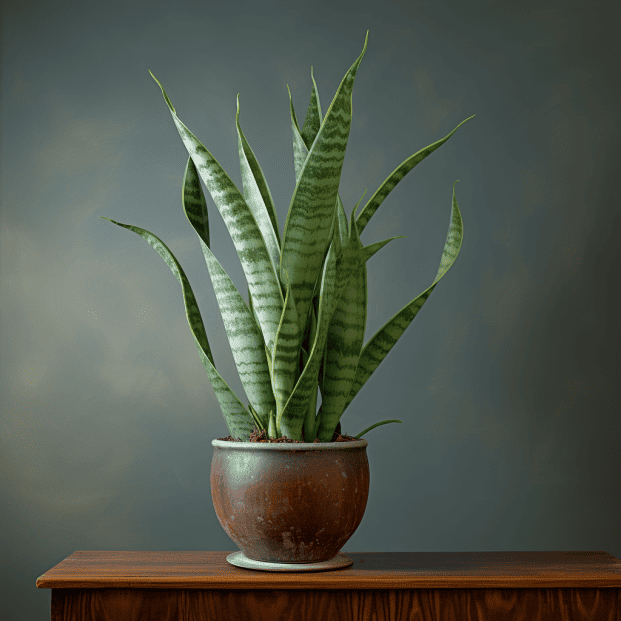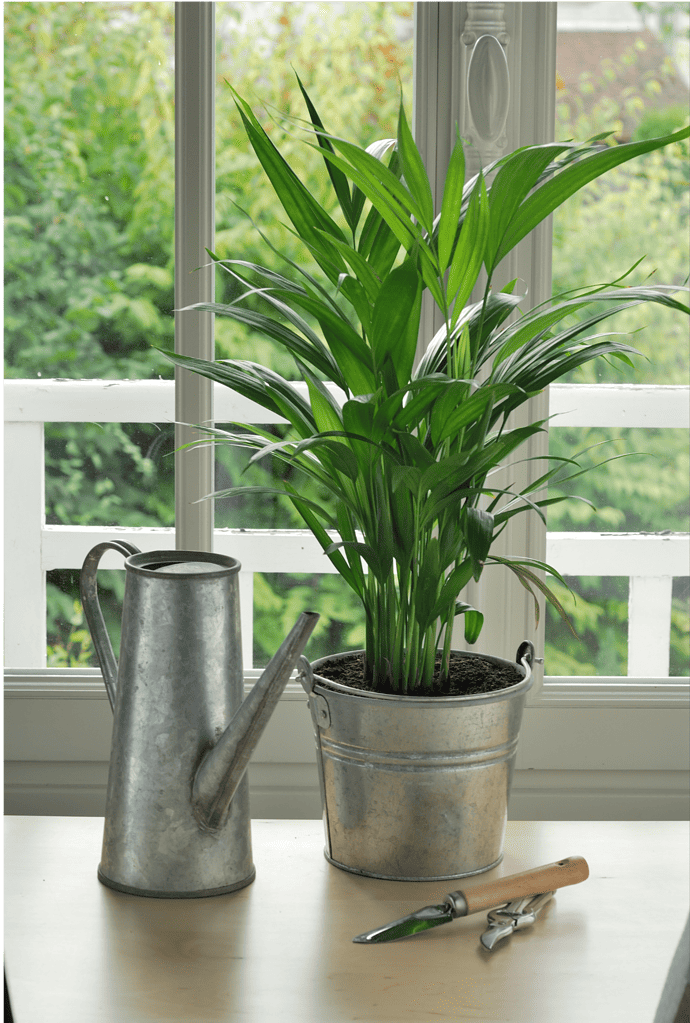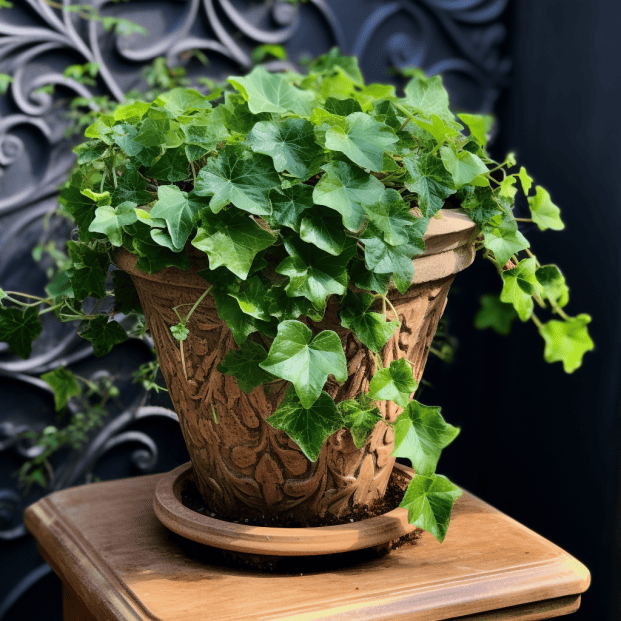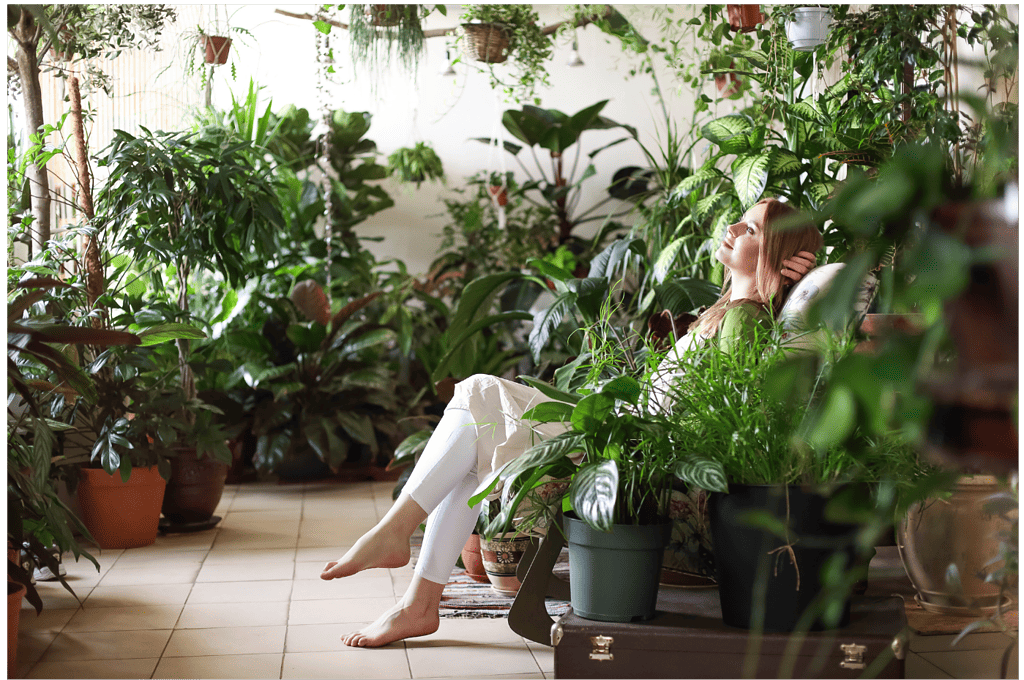Houseplants are a simple and effective way to boost productivity and concentration in the workplace or at home. Research has shown that incorporating plants into indoor spaces can have a range of benefits for both mental and physical health. For example, a study published in the Journal of Physiological Anthropology found that indoor plants can reduce stress levels and increase feelings of comfort.
In addition to reducing stress, houseplants can also improve concentration and productivity. A study by the University of Exeter found that adding just a few plants to an otherwise sparse office environment can increase productivity by up to 15%. Plants can also help purify the air, removing harmful toxins and increasing oxygen levels, improving brain function and cognitive abilities.
Overall, incorporating houseplants into indoor spaces can benefit both mental and physical health, including increased productivity, concentration, and reduced stress levels. Whether working from home or in an office, adding a few plants to your space can be a simple and effective way to improve your overall well-being.
The Science Behind Houseplants and Productivity
Houseplants are not just a decorative addition to your home or office. They have been scientifically proven to have several benefits, including boosting productivity and concentration. This section will explore the science behind houseplants and their impact on productivity.

Understanding Photosynthesis
Photosynthesis is the process by which plants convert light energy into chemical energy. This process involves the absorption of carbon dioxide and the release of oxygen. Houseplants use photosynthesis to produce oxygen, which is essential for human survival.
Houseplants and Oxygen Production
Indoor air can be polluted with harmful chemicals, negatively impacting human health and productivity. Houseplants can help purify the air by removing toxic chemicals and producing oxygen. According to a study by NASA, indoor plants can remove up to 87% of air toxins in just 24 hours.
Role of Houseplants in Humidity Control
Indoor air can also be too dry, which can cause respiratory problems and reduce productivity. Houseplants can help regulate indoor humidity levels by releasing moisture through transpiration. This process involves the release of water vapor from the leaves of plants into the air.
Houseplants are crucial in boosting productivity and concentration by purifying indoor air, producing oxygen, and regulating humidity levels. By understanding the science behind houseplants, you can make informed decisions about which plants to incorporate into your home or office.
Houseplants and Mental Health
Houseplants are not just a beautiful addition to any home or office, but they can also positively impact mental health. This section will explore how houseplants can benefit mental health, including stress reduction, mood enhancement, and improved sleep quality.
Houseplants and Stress Reduction
Stress is a common problem that many people face daily. Fortunately, studies have shown that houseplants can help reduce stress levels. A study published in the Journal of Physiological Anthropology found that interaction with indoor plants can reduce psychological and physiological stress. This is likely because plants have a calming effect on people and can help lower blood pressure and reduce feelings of anxiety.
Houseplants and Mood Enhancement
In addition to reducing stress levels, houseplants can also enhance mood. A study of more than 4,200 people found that houseplants brought emotional benefits to 74% of participants during COVID-19 lockdowns. Caring for plants can give you a sense of purpose and help you feel less stressed. Additionally, plants can improve air quality, leading to better overall well-being.
Houseplants and Sleep Quality
Finally, houseplants can also improve sleep quality. A study by the University of Agriculture in Norway found that indoor plants can help reduce mental fatigue and enhance the quality of sleep. This is likely since plants release oxygen at night, which can help to improve air quality and promote better sleep.

In conclusion, houseplants can positively impact mental health by reducing stress levels, enhancing mood, and improving sleep quality. If you are looking for a natural way to enhance your well-being, consider adding some greenery to your home or office.
Specific Houseplants for Productivity and Concentration
When choosing houseplants for productivity and concentration, several options exist. Here are some of the best houseplants for boosting productivity and engagement:
Spider Plants and Productivity
Spider plants are one of the most popular houseplants for improving productivity. These plants are easy to care for and can grow in various conditions. Spider plants are known for their ability to remove harmful toxins from the air, which can help to improve air quality and enhance productivity.
Snake Plants and Concentration
Snake plants are another great option for improving concentration. These plants are known for their ability to remove toxins from the air and can help to enhance the quality of air. Snake plants are also low-maintenance and can thrive in various conditions, making them an ideal choice for busy individuals.

Bamboo Palm and Creativity
Bamboo palms are an excellent option for boosting creativity. These plants are known for their ability to remove harmful toxins from the air and can help to improve air quality. Bamboo palms are also visually appealing and can help create a calming and relaxing environment, which can boost creativity.

English Ivy and Attention
English ivy is an excellent option for improving attention and focus. These plants are known for their ability to remove harmful toxins from the air and can help to enhance the quality of air. English ivy is also visually appealing and can help to create a calming and relaxing environment, which can be beneficial for improving attention and focus.

Overall, incorporating houseplants into your home or office can positively impact productivity and concentration. You can create a healthier and more productive environment by choosing the right plants for your needs.
Houseplants and Physical Health
Houseplants are not only visually appealing, but they can also positively impact physical health. Here are some ways that houseplants can benefit physical health:
Houseplants and Blood Pressure
Research has shown that having plants in a room can help reduce blood pressure. In one study, participants exposed to plants in a room had lower systolic blood pressure readings than those not exposed to plants. This effect was seen even when the participants were not actively interacting with the plants.
Houseplants and Illness Recovery
In addition to being aesthetically pleasing, houseplants may also aid in illness recovery. Research has shown that patients in hospital rooms with plants have reported less pain, anxiety, and fatigue than those without plants. Additionally, patients with plants in their rooms have been found to have lower heart rates and blood pressure.
Houseplants and Pain Reduction
Houseplants may also have pain-reducing properties. A study on patients recovering from a surgical procedure found that those with plants in their rooms required less pain medication than those without plants.
Overall, incorporating houseplants into indoor spaces can positively impact physical health. Houseplants offer a natural and non-invasive way to promote physical well-being, from reducing blood pressure to aiding in illness recovery and pain reduction.
Houseplants and Indoor Air Quality
Indoor air quality is essential to creating a healthy and productive environment. Poor air quality can lead to various health problems, including headaches, fatigue, and respiratory issues. Houseplants can play a role in improving indoor air quality by reducing pollutants and increasing oxygen levels.
Houseplants and VOCs Elimination
Volatile organic compounds (VOCs) are a type of pollutant commonly found in indoor environments. VOCs come from various sources, including cleaning products, paints, and furniture. VOC exposure can cause multiple health problems, including eye and respiratory irritation, headaches, and dizziness.
Houseplants can help to eliminate VOCs from indoor air. Several houseplants are particularly effective at removing VOCs, including spider plants, peace lilies, and Boston ferns. These plants absorb VOCs through their leaves and convert them into harmless byproducts.



Houseplants and Formaldehyde Absorption
Formaldehyde is another common indoor air pollutant. Formaldehyde is found in various household products, including adhesives, carpets, and upholstery. Exposure to formaldehyde can cause multiple health problems, including eye and respiratory irritation, headaches, and dizziness.
Houseplants can help to absorb formaldehyde from indoor air. Several houseplants are particularly effective at removing formaldehyde, including bamboo palm, snake plant, and golden pothos. These plants absorb formaldehyde through their leaves and convert it into harmless byproducts.
In conclusion, houseplants can be crucial in improving indoor air quality. Houseplants can help create a healthier and more productive environment by eliminating VOCs and absorbing formaldehyde.
Office spaces can be stressful and uninspiring. However, adding a few houseplants can transform the environment, making it more welcoming and calming. Studies have shown that plants in the office can reduce stress levels, increase productivity, and even improve air quality.
Some of the best plants for office spaces include:
- Snake Plant: Known for its air-purifying properties, it is perfect for offices with little natural light.
- Peace Lily: This plant is excellent for removing toxins from the air and adding a touch of elegance to the office.
- Spider Plant: Easy to care for and great for improving air quality, the spider plant is perfect for busy offices.

Houseplants in Classrooms
Classrooms can be dull and uninspiring, but houseplants can help create a more engaging and welcoming environment. Houseplants can help students focus and improve their concentration, making learning and retaining information easier.
Some of the best plants for classrooms include:
- Aloe Vera: This plant is easy to care for and has air-purifying properties, making it perfect for classrooms.
- English Ivy: Known for reducing mold and improving air quality, it is an excellent choice for classrooms.
- Rubber Plant: This plant is excellent for removing toxins from the air and adding a touch of greenery to the school.

Houseplants and Home Gardening
Home gardening has become increasingly popular, and houseplants are a great way to add greenery to your home. Houseplants can help improve air quality, reduce stress, and even boost mood.
Some of the best plants for home gardening include:
- Pothos: This plant is easy to care for and can grow in various lighting conditions, making it perfect for any room in the house.
- Chinese Evergreen: Known for its air-purifying properties, the Chinese Evergreen is an excellent choice for any home.
- Fiddle Leaf Fig: This plant is perfect for adding a touch of elegance to your home and can grow up to six feet tall.

Houseplants are a great way to improve productivity and concentration in different settings. In an office, classroom, or home, adding a few houseplants can help create a more welcoming and calming environment.
Conclusion
In conclusion, houseplants can significantly add to any workspace, home, or office. They offer a range of benefits that can improve productivity, concentration, and overall health and well-being.
Studies have shown that indoor plants can reduce stress levels, boost mood, and increase creativity and productivity by up to 15% [1]. They can also help to clean indoor air by absorbing toxins, increasing humidity, and producing oxygen [5]. This can lead to a healthier and more pleasant environment, which can, in turn, improve concentration and focus.
Additionally, caring for plants can be a therapeutic and rewarding experience that can help to reduce stress and anxiety. It can also provide a sense of connection to nature and the environment, which can be beneficial for mental and emotional well-being.
Overall, incorporating houseplants into your workspace or home can be a simple and effective way to improve productivity, concentration, and overall health and well-being. Whether you choose a small succulent or a larger statement plant, adding a touch of greenery to your space can have a big impact on your daily life.
[1] NBC News: Why Indoor Plants Make You Feel Better [5] The Sill: The Benefits of Having Plants in Your Home or Office
Frequently Asked Questions
What are some indoor plants that can improve productivity and concentration?
There are several indoor plants that can improve productivity and concentration. Some of the most effective plants include the snake plant, peace lily, spider plant, and English ivy. These plants are known for their ability to purify the air and remove toxins, which can help improve cognitive function and reduce stress levels.
How do indoor plants positively impact mental health?
Indoor plants can positively impact mental health in several ways. Studies have shown that plants can help reduce stress and anxiety, improve mood, and increase overall well-being. Plants can also improve air quality, which can lead to better sleep and increased energy levels.
What are some of the environmental benefits of having indoor plants?
Indoor plants provide several environmental benefits. They can help purify the air, remove toxins, and increase oxygen levels. Plants can also help regulate humidity levels and reduce the risk of mold growth. Additionally, plants can help reduce energy consumption by improving insulation and reducing the need for air conditioning.
Can indoor plants help reduce stress and anxiety?
Yes, indoor plants can help reduce stress and anxiety. Studies have shown that plants can help improve mood, reduce stress levels, and increase overall well-being. Plants can also help improve air quality, which can lead to better sleep and increased energy levels.
What are some of the advantages and disadvantages of having indoor plants?
Some advantages of having indoor plants include improved air quality, increased productivity and concentration, and reduced stress and anxiety levels. However, there are also some disadvantages to consider, such as the need for regular maintenance and the risk of allergies or toxicity for certain plants. It is important to choose the right plants for your space and to take proper care of them to maximize the benefits.
Do studies support the idea that indoor plants can improve productivity and concentration?
Yes, studies have shown that indoor plants can improve productivity and concentration. One study found that adding plants to an office environment can increase employee creativity and productivity by up to 45% and 38%, respectively. Another study found that interacting with plants for just one hour can increase memory retention and cognitive function.


